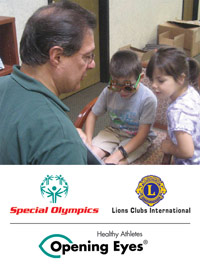NEW YORK—Since 1968, Special Olympics has been a welcome way for children with intellectual disabilities feel like they were part of the action when it came to getting into the “game” of organized sports. An added benefit came along in 1999 with the founding of Special Olympics Lions Club International Opening Eyes, a philanthropic organization dedicated to improving the quality of life and optimizing vision, eye health and visual skills through eye health care for Special Olympics athletes. The program is funded by Lions Club International and eyewear is provided by Essilor, Safilo and Liberty Sport, according to Paul Berman, OD, FAAO, founder and global clinical advisor for the organization.

|
| A new feature of the Special Olympics Healthy Athletes is the addition of a Young Athletes program. |
“Our data shows that 37 percent of the athletes need new or different glasses, and 66 percent of them have not had their eyes examined in the last three years,” Berman said. “This indicates a large void that the Special Olympics Lions Clubs International Opening Eyes program is trying to fulfill.”
Since its inception, the organization has screened some 198,687 athletes and dispensed 85,419 pairs of new custom, prescription eyewear throughout 25 states and in more than 70 countries worldwide. But the numbers only tell a part of the story.
Opening Eyes vision screenings take place at select Special Olympics sporting events worldwide and volunteers from Lions International play an integral part in the success of the program through hands-on event support. Volunteers help with registration, color vision testing, visual acuity tests and distribution of glasses and protective sports goggles. A prime goal of Opening Eyes is to teach and prepare vision specialists, including professors and students, how to better care for this underserved population.
Berman said, “One thing that always happens is that the attitudes of many of our volunteers changes from pity, to acceptance, to respect of the Special Olympics athletes, who have all different degrees of intellectual disabilities. Professional volunteers not only have the opportunity to improve their clinical skills with this population, but also have their attitudes transformed.”
A new feature of the Special Olympics Healthy Athletes is the addition of a Young Athletes program which will be featured at the upcoming AOA Convention on June 16 from 10:00 a.m. – 2:00 p.m. in the Orange Blossom Room of the Gaylord Hotel in Orlando, Fla. Anyone interested in volunteering to give young athletes eye exams can contact Paul Berman at [email protected].
For more info about The Special Olympics-Lions Clubs International Opening Eyes program, please visit www.specialolympics.org.
To find out more about Special Olympics Healthy Athletes Program, which includes Opening Eyes, go to www.specialolympics.org/healthy_athletes.aspx. ■ ■
Mary Kane
[email protected]











